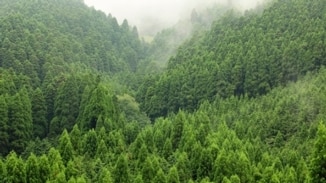
World Wilderness Down 10 Percent in 20 Years
世界荒野面积20年内减少百分之十
South America and central Africa lost the most wilderness in a decline since the 1990s that saw the planet's wild areas down by a tenth
自上世纪90年代地球荒野面积减少十分之一,南美洲和非洲中部地区情况最严重
播音\撰文:史蒂夫·米尔斯基(Steve Mirsky)
翻译:杨枭
审校:丁可含
Only about 23 percent of the world’s land area is still what you’d call wilderness—where indigenous people, wildlife, plants and microbes get a chance to live with little or no disturbance from large human populations. But even that current figure of 23 percent is down by a tenth in just the last couple of decades. Which translates into an area the size of Alaska being converted away from wilderness since the 1990s. That’s according to a study in the journal Current Biology that was also announced at the just completed Honolulu meeting of the International Union for Conservation of Nature. [Watson et al, Catastrophic Declines in Wilderness Areas Undermine Global Environment Targets]
世界上只有约23%的土地是荒野,原住民、野生动物、植物和微生物极少受到人类活动影响。过去几十年中,荒野面积锐减了十分之一。这意味着自上世纪90年代起,有和阿拉斯加等面积的荒野消失。这一结果来源于 “当代生物学”杂志的一项研究,它也被发表在国际自然保护联盟在火奴鲁鲁召开的会议上。
The research found that the regions that suffered the biggest wilderness losses were South America and Central Africa. South America lost almost a third of its wilderness while Africa’s is down about 14 percent.
研究发现,荒野损失最严重的地区是南美洲和非洲中部。南美洲失去了近三分之一的荒野,而非洲地区的荒野也减少了大约百分之十四。
James Watson is the lead author of the study. He’s with the Wildlife Conservation Society and the University of Queensland—he’s no relation to the more famous DNA double helix James Watson.
詹姆斯·沃森(James Watson)是该项研究的第一作者。他与野生动物保护协会和昆士兰大学一起做了这项研究,但他与那个更著名的DNA双螺旋的詹姆斯·沃森没有关系。
In the journal article he and his colleagues write: “The continued loss of wilderness areas is a globally significant problem with largely irreversible outcomes for both humans and nature: if these trends continue, there could be no globally significant wilderness areas left in less than a century. Proactively protecting the world’s last wilderness areas is a cost-effective conservation investment and our best prospect for ensuring that intact ecosystems and large-scale ecological and evolutionary processes persist for the benefit of future generations.” And future generations includes both the organisms in the remaining wilderness—and us.
在期刊文章中他和同事写道:“荒野面积的持续性减少是一个全球性的重大问题,对人类和自然都有无法补救的后果:如果这种趋势继续下去,在不到一个世纪内将可能没有全球性的荒野地带。主动保护世界上最后的荒野地区是高效益的保护投资,是我们确保完整的生态系统和大规模生态和进化过程持续,为后代利益着想的最好出路。”而后代既包括生于荒野中的有机体,也包括我们自己。
原文链接:
https://www.scientificamerican.com/podcast/episode/world-wilderness-down-10-percent-in-20-years/
(题图来源:http://www.scientificamerican.com)